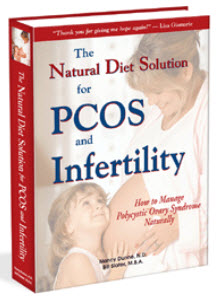PCOS, Acne and Male Hormones
Acne is a common symptom of PCOS. It is an inflammatory skin disorder that involves interactions between hormones, hair, sebaceous (oil-secreting) glands and bacteria.
Free PCOS Newsletter
Women with polycystic ovarian syndrome are susceptible, possibly due in part to excess levels of androgens (male sex hormones) in the skin. Teenagers are also susceptible around the onset of puberty due to an increase in the production of androgens. This androgen, a metabolite of testosterone, is called "DHT" (dihydrotestosterone).
"I have been suffering from terrible cystic acne due to PCOS since I stopped taking my birth control. I want to let you know how much I appreciate your ebook and all of the research you have done for PCOS. I cut out dairy for the last 5 days and my skin is almost healed! I cannot believe it. Thank you, thank you!" -- EB
The Natural Diet Solution for PCOS and Infertility
It is thought that DHT stimulates the production of "oil", which eventually can lead to clogged glands or pores. Clogged pores can no longer release oil and allow bacteria to grow and multiply in the follicle, leading to inflammation.
Enzymes from this bacteria breakdown triglycerides in the sebum (oil) to form "free fatty acids" that further irritate the follicular wall. Rupture of the follicle, accompanied by the release of free fatty acids, bacterial products and keratin, results in an abscess that heals with scars in severe cases.
What Causes It?
It can be caused or exacerbated by a combination of factors:
- Hormonal imbalances - insulin resistance and hyperinsulinism (common in polycystic ovary syndrome)
- Diet high in refined, high-glycemic carbohydrates that increase insulin levels.
- Heredity - genetic predisposition to polycystic ovary syndrome.
- Stress.
- Medications- anabolic steroids, anti-epileptics, lithium and some oral contraceptives.
- Industrial pollutants - petrochemicals such as machine oils, coal tar derivatives, chlorinated hydrocarbons, etc.
- Cosmetics.
- Over-washing or repeated rubbing of the skin.
- Hormonal imbalances - increased progesterone secretion prior to menstruation.
- Allergic reactions to foods.
Symptoms
- Persistent, recurrent red spots or swellings on the skin
- These spots or swellings usually occur on the face, but may also be found on the back, shoulders, chest, and neck.
- Bulging spots under the skin with closed pores (whiteheads).
- Dark pimples under the skin with open pores (blackheads).
- Presence of fluid-filled lumps known as nodules and cysts which may become abscesses.
- Scarring of the skin in severe cases.
- May worsen during the winter months and improve in summer due to the beneficial effects of the sun.
Acne and PCOS Diagnosis
Diagnosis is based on the presence of comedones (pimples) and lesions at various stages of development. Left untreated, it can lead to both scarring and abnormal pigmentation.
It can be caused or exacerbated by elevated androgen levels. Androgen disturbances should be suspected when female adolescents have severe acne or when it persists into adult years, particularly when accompanied by other androgen-related effects such as hirsutism, infertility and weight problems.
If you have acne, hirsutism, or hair loss, these tests would be helpful in diagnosing the cause of your problems: serum levels of testosterone, DHEAS, LH, FSH, prolactin, cholesterol, triglycerides, and thyroid hormones. A two-hour glucose tolerance test with accompanying insulin levels should also be done.
Many PCOS women will have abnormal levels of one or more of these tests, although normal values do not rule out a diagnosis. Once your hormone imbalances are identified, the appropriate treatment can be recommended.
Related Articles
Sources:
Br J Derm 1977, 97:561-6
J Steroid Biochem 1984, 20:1089-93
Med Hypoth 1995, 44:490-2
Acta Derm Venerol 1984, 64:9-14
Med J Austral 1990, 53:455-8
Am Acad Dermatol 1987, 17:1033-41
El-Akawi Z et al, Does the plasma level of vitamins A and E affect acne condition?, Clin Exp Dermatol, 2006; 31(3): 430-3.
Get Answers to your Questions about
- Fertility
- Weight Control
- Hair Loss
- Stress
- Unwanted Hair
- Acne...and more!
FREE PCOS Report
and Newsletter

Your email is safe with us. We respect your privacy, and you may unsubscribe at any time.
Recent Articles
-
PCOS Long Journey to The Happy End
Apr 30, 18 07:24 PM
Hi Girls, Maybe my story will have one day a good end but I am not there yet. Until I was 31 years old I lived my dream, having lovely husband, good -
PCOS and Miscarriage
Apr 17, 18 04:03 PM
Proper diet and natural supplements can help the body maintain a pregnancy through successful delivery.
-
How to Deal with PCOS and Stress
Apr 04, 18 04:19 PM
Your body has a natural capacity to heal itself if you provide it with the necessary tools.






